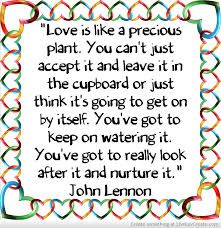How well are you paying attention to the people you love? Do these people really know they matter to you? Using John Lennon’s analogy, are you doing enough to “water” the relationships that are important to you?
When, for whatever reason, we lose our willingness to invest the time, energy and emotion it takes to keep an important relationship alive and thriving, we can bring great heartache to family members and friends we love, or with whom we have had a deep connection. In the midst of our own busy and stressful lives, we may not even realize we’re neglecting to nurture relationships that matter to us.
In her book, Daring Greatly: How the Courage to Be Vulnerable Transforms the Way We Live, Love, Parent and Lead, research professor and vulnerability expert Brene Brown refers to such neglect as disengagement. She speaks of disengagement as the ultimate betrayal of trust:
What’s the worst betrayel of trust? He sleeps with my best friends. She lies about where the money went. He/she chooses someone over me. Someone uses my vulnerability against me……All terrible betrayals, definitely, but there is a particular sort of betrayal that is more insidious and equally corrosive to trust.
In fact, this betrayal usually happens long before the other ones. I’m talking about the betrayel of disengagement. Of not caring. Of letting the connection go. Of not being willing to devote time and effort to the relationship. The word betrayal evokes experiences of cheating, lying, breaking a confidence, failing to defend us to someone else who’s gossiping about us, and not choosing us over other people. These behaviors are certainly betrayals, but they’re not the only form of betrayal. If I had to chose the form of betrayal that emerged most frequently from my research and that was the most dangerous in terms of corroding the trust connection, I would say disengagement.
When the people we love or with whom we have a deep connection stop caring, stop paying attention, stop investing and fighting for the relationship, trust begins to slip away and hurt starts seeping in. Disengagement triggers shame and our greatest fears–the fears of being abandoned, unworthy, and unlovable. What can make the covert betrayal so much more dangerous than something like a lie or an affair is that we can’t point to the source of our pain–there’s no event, no obvious evidence of brokenness. It can feel crazy-making.
In light of these wise words from Brene Brown, take a moment to examine the relationships that are most important to you and ask: To what extent have I slipped into excessive distance and disengagement? Am I paying enough attention to my partner? My children? My parents? Other family members and friends that are important to me? Am I investing the time, energy and emotion it takes to keep these relationships alive and thriving? Or am I allowing one or more of my important relationships to wither away like a plant that didn’t get enough water?
Important relationships sometimes need an engagement infusion.
If you are the one disengaged, what are some specific efforts you can make to re-engage? Even a quick and thoughtful email, text or phone call to say, “I’m thinking of you and want to know how you’re dong……I love you” can go a long way!
If you are the one suffering heartache from the disengagement of another person, try talking openly with them about how their disengagement is affecting you. They may just need a wake-up call. Stay calm, and do not criticize or blame. Ask for their engagement–or their honesty if they do not wish to invest more time, energy and emotion into the relationship. If they are interested in re-engaging, talk about what you would like in your relationship with them–not what you expect. For example, “I would like to be included in your life for the joy of it, not because I expect it” can be a game-changer. Be prepared to give a few examples of what would help you feel more connected, and to recognize that the other person is free to respond however they choose.
